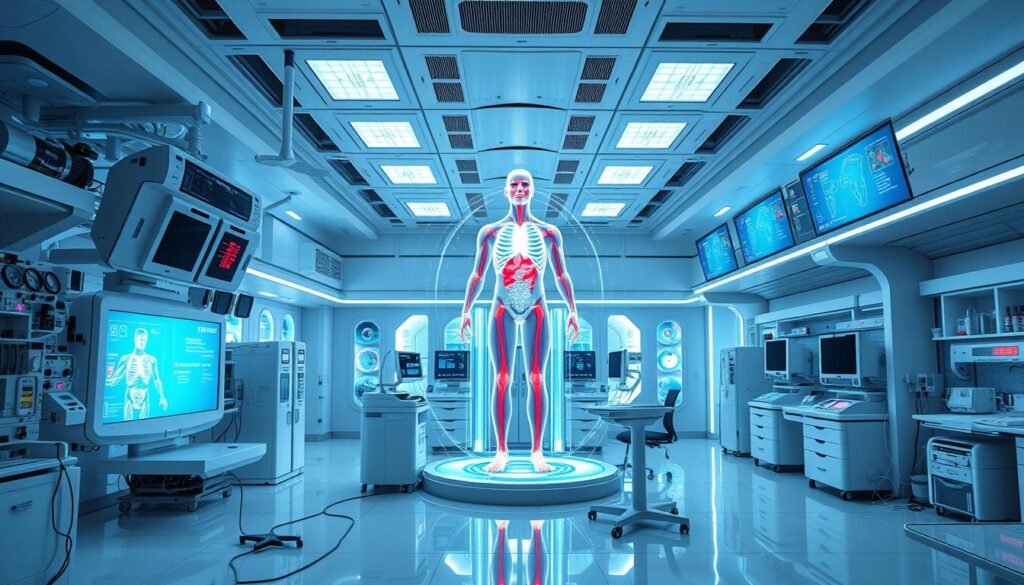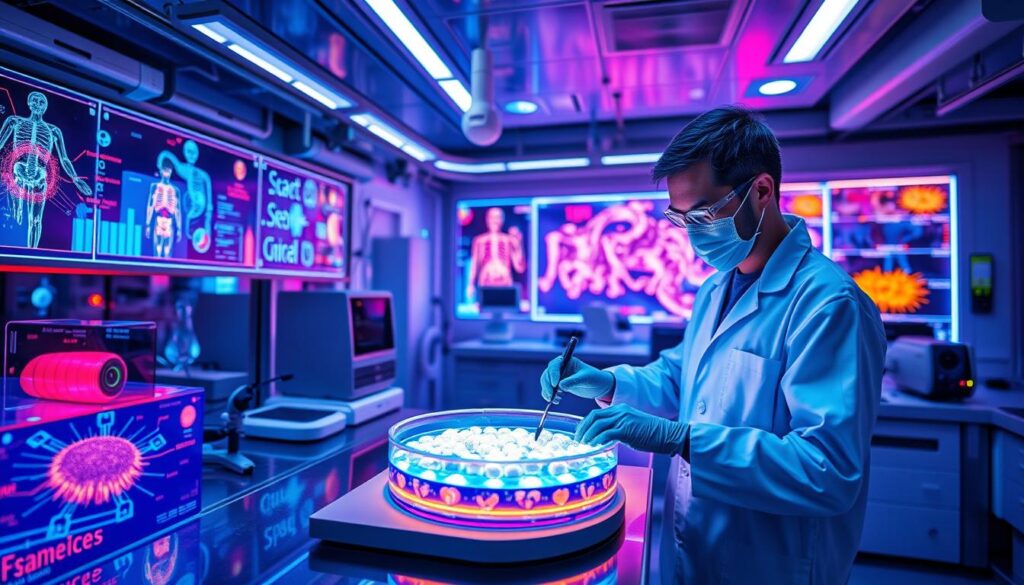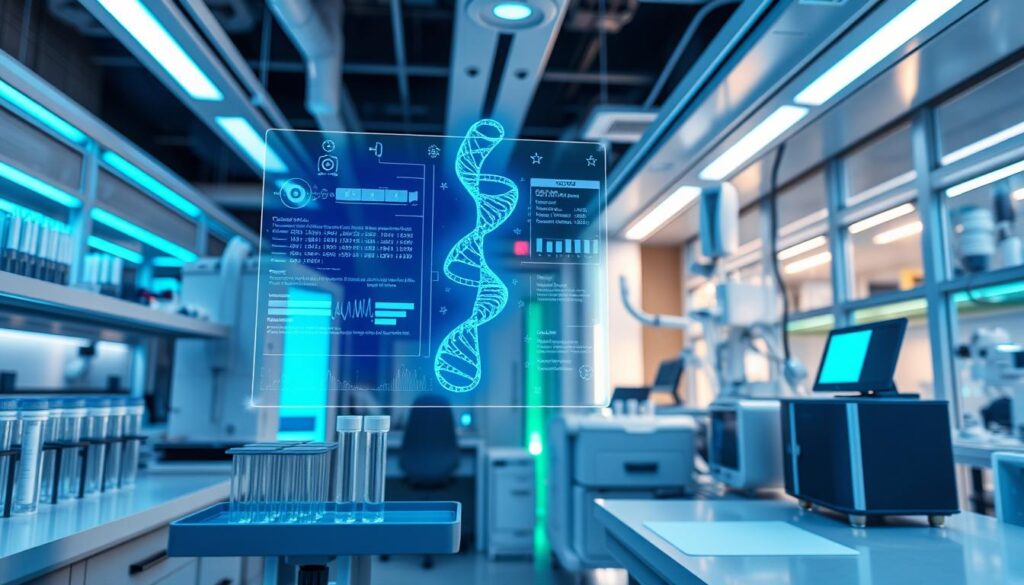In recent years, medical Therapies science has seen a big change. New discoveries and innovations are changing how we care for patients. Things like new medicines, gene editing, and mRNA vaccines are making a big difference. They help us diagnose and treat diseases better.
Wearable devices, telemedicine, 3D printing, and nanotechnology are also making healthcare better. They make medical services more accessible and tailored to each person’s needs.
This article looks at the latest in medical research and how it’s changing healthcare. It talks about the new treatments and therapies that are improving patient care. It also explores how these advancements are tackling current healthcare challenges.
Key Takeaways
- Medical research has seen a lot of new therapies and treatments, from new medicines to advanced technologies.
- Advances in gene editing, mRNA vaccines, and wearable devices have improved how we diagnose and treat diseases.
- Integrative medicine and holistic approaches are becoming more popular. They focus on the body’s natural healing and the importance of a healthy lifestyle.
- Personalized medicine and targeted therapies are changing how we treat patients. They use genetic testing and biomarkers to create treatment plans that fit each person.
- The use of artificial intelligence and digital health solutions is also changing healthcare. They help with things like skin cancer detection and predicting patient outcomes.
Understanding Contemporary Medical Treatment Approaches
The medical field has changed a lot. Now, treatments mix old ways with new ones. This mix, called integrative medicine, looks at the whole person. It considers their body, mind, feelings, and spirit.
Evolution of Treatment Methods
Old medical treatments mostly used drugs, radiation, and surgery. But, lately, people have seen the good in other ways like acupuncture and meditation. These methods are now part of regular healthcare.
Role of Evidence-Based Medicine
Evidence-based medicine is key in picking good treatments. Studies and research show what works best. This helps doctors create plans that really help patients.
Integration of Traditional and Modern Practices
Integrative medicine combines old and new treatments. It’s all about the patient, using the best of both worlds. This way, health care is more complete and personal.
As health care keeps changing, mixing old and new will be important. It will help make treatments better and more effective for everyone.
Medical Therapies: From Conventional to Cutting-Edge

The medical world has changed a lot. Now, we have new, advanced treatments. These include regenerative medicine, like stem cell therapy, tissue engineering, and gene therapy. They promise to cure diseases we couldn’t treat before.
Stem cell therapy is helping people with spinal cord injuries. Tissue engineering, like 3D printing, lets us replace damaged organs. Gene therapy is tackling genetic diseases like sickle cell anemia and cystic fibrosis. Nanotechnology is making drugs work better and with fewer side effects.
These new treatments are real and are changing how we treat diseases and injuries. Precision medicine is tailored to each person. It uses genetic information, lifestyle, and environment to make treatments more effective.
Artificial intelligence (AI) and big data are making these treatments even better. They help create personalized plans and predict disease patterns. Telehealth and wearable devices are also changing how we get and manage our health care.
As we keep innovating, the future looks bright for patients and doctors. These advanced treatments open up new possibilities. They offer solutions to some of the toughest medical challenges.
“Regenerative medicine holds the promise of extending lifespans and improving quality of life for patients, revolutionizing the way we approach healthcare.”
The shift from old to new medical therapies shows how far science and tech have come. With regenerative medicine, precision treatments, and digital health, we’re on the verge of a new era in healthcare.
Regenerative Medicine and Cell-Based Treatments

Medicine is changing fast, thanks to regenerative therapies and cell-based treatments. These new methods use stem cells, tissue engineering, and gene therapy. They are changing how we treat many health problems.
Stem Cell Therapy Applications
Stem cell research has led to new treatments. Trials have shown great results. For example, people with Epidermolysis Bullosa got better skin from keratinocyte cultures of epidermal stem cells.
Those with macular degeneration saw their vision improve. This was thanks to induced pluripotent stem cells turned into pigment epithelial cells for the retina.
Tissue Engineering Breakthroughs
Tissue engineering has made big strides, especially with 3D printing. This tech lets us make custom tissues and organs. It could fix damaged organs like the liver, pancreas, and heart.
These advances in regenerative medicine could change lives. They offer hope for those in need.
Gene Therapy Developments
Gene therapy has also made huge leaps, especially with CRISPR-Cas9. It’s now possible to treat genetic disorders like cystic fibrosis and sickle cell anemia. These breakthroughs mean more targeted treatments for rare genetic conditions.
These new regenerative medicine methods could change healthcare. They offer new ways to tackle many medical challenges. As research and trials keep going, the future looks bright for stem cell therapy, tissue engineering, and gene therapy.
Artificial Intelligence and Digital Health Solutions
Artificial Intelligence (AI) and machine learning have changed healthcare a lot. They help make patient care better and make medical systems work more efficiently. AI can look at lots of medical data to find patterns and predict health issues.
AI has shown it can do many things well in healthcare. It can spot skin cancer, guess when patients might go back to the hospital, and predict when psychosis might start. With machine learning, doctors can give more tailored care, which is better for patients and saves money.
Telemedicine and wearable technology make AI in healthcare even better. Telemedicine lets patients get care from home. Wearable devices keep track of health signs and send updates to doctors.
But, using AI in healthcare comes with its own set of problems. There are worries about keeping data safe, AI being biased, and making sure AI is used right in making medical decisions. Doctors, data experts, and lawmakers need to work together to use AI safely and wisely.
The future of healthcare looks bright with AI and digital health solutions. They promise to make care more personal, efficient, and fair. This could lead to better health for people all over the world.
“Artificial intelligence has the potential to transform healthcare, making it more personalized, predictive, and preventive. However, we must ensure that this technology is developed and deployed responsibly, with a focus on ethics, equity, and human-centered design.” – Tedros Adhanom Ghebreyesus, Director-General of the World Health Organization
Personalized Medicine and Targeted Therapies

Modern medicine is changing with personalized care. This new way tailors treatments to each person’s genes, lifestyle, and environment. Genetic tests help doctors find the best treatments for each patient.
Genetic Testing and Treatment Selection
Genetic testing has improved a lot. It helps doctors pick the right treatments for you. This method has led to better results and fewer side effects.
Biomarker-Based Interventions
Biomarkers are key in personalized medicine. They help target treatments for diseases, especially cancer. For example, CAR T-cell therapy is a personalized treatment for some lymphomas.
Patient-Specific Treatment Plans
Precision medicine does more than just choose treatments. It creates plans that fit each person’s needs. This approach aims to make treatments better, with fewer side effects.
Personalized medicine is changing how we treat diseases. It offers hope for better treatments. As research grows, we’ll see even more progress in patient care, leading to better health for all.
Also Read : What Are The Types Of Medical Course Available?
Conclusion: The Future of Medical Treatment
The future of medicine is bright, thanks to new technologies and personalized care. Advances in regenerative medicine, gene editing, and AI will change how we treat patients. But, we must also think about making these advances affordable and ethical.
Healthcare is moving towards preventing and curing diseases, not just managing them. We will see more use of traditional and modern medicine together. This will help us treat diseases better and keep people healthy for longer.
Technology is changing healthcare fast, making things smaller and cheaper. By 2050, over 100 billion devices will be connected to the internet, helping us monitor our health. Gene editing, DNA sequencing, and nanomedicine will also change how we diagnose and treat diseases, making care more precise for each patient.
FAQs
Q: What are modern medical therapies and how do they differ from traditional therapies?
A: Modern medical therapies often involve the use of advanced techniques and pharmaceuticals that may include drug therapy, radiation therapy, and experimental therapies. They differ from traditional therapies by focusing on evidence-based practices, often supported by clinical trials and guidelines from healthcare authorities like the U.S. Food and Drug Administration and the European Medicines Agency.
Q: How can I find clinical trials related to a specific substance or therapy?
A: You can find clinical trials by using databases like PubMed, where you can conduct a saved search for specific terms. Additionally, you can check clinical trial registries that often provide RSS feeds for the latest studies related to your area of interest.
Q: What is the role of citations in exploring medical therapies?
A: Citations are crucial for referencing studies and findings in medical literature. They allow practitioners and researchers to evaluate the efficacy of therapies by examining the original research. Make sure you’re familiar with how to cite studies correctly, including using email citation tools for sharing information.
Q: Are there specific publication types that I should look for when researching therapies?
A: Yes, when researching therapies, it’s beneficial to look for meta-analyses, systematic reviews, and randomized controlled trials, as these publication types provide high-quality evidence on the effectiveness and safety of treatments.
Q: What are some complementary and alternative medicine options for chronic diseases?
A: Complementary and alternative medicine options for chronic diseases may include therapies such as acupuncture, herbal supplements, and nutritional interventions. These therapies can be used alongside conventional treatments to improve symptom management and overall health.
Q: How do I evaluate the effectiveness of a new therapy for a specific condition?
A: Evaluating the effectiveness of a new therapy involves reviewing clinical trial data, analyzing outcomes, and considering factors such as patient-reported outcomes and the therapy’s safety profile. You may also refer to guidelines from healthcare organizations to assess the utility of the therapy.
Q: What should I know about the potential side effects of chemotherapy and radiation therapy?
A: Chemotherapy and radiation therapy can have various side effects, including fatigue, nausea, and risk of infections. It’s important to discuss these effects with your healthcare practitioner, who can provide guidance on managing symptoms and the potential benefits versus risks of these treatments.
Q: How does the U.S. Food and Drug Administration regulate new therapies?
A: The U.S. Food and Drug Administration regulates new therapies through a rigorous approval process, which includes reviewing clinical trial data to ensure that new drugs and therapies are safe and effective before they can be prescribed by providers.
Q: What is the significance of external resources in medical research?
A: External resources, such as academic journals and online medical databases, are significant as they provide access to a wealth of research studies, reviews, and guidelines that can inform practitioners about the latest findings and innovations in medical therapies.
Source Links
- https://pmc.ncbi.nlm.nih.gov/articles/PMC10401902/
- https://ccaps.umn.edu/story/holistic-health-approaches-integrating-traditional-and-modern-medicine
- https://www.cancer.gov/about-cancer/treatment/cam